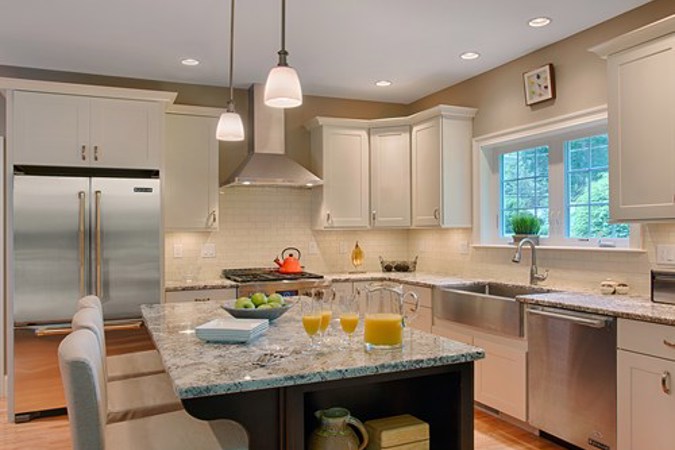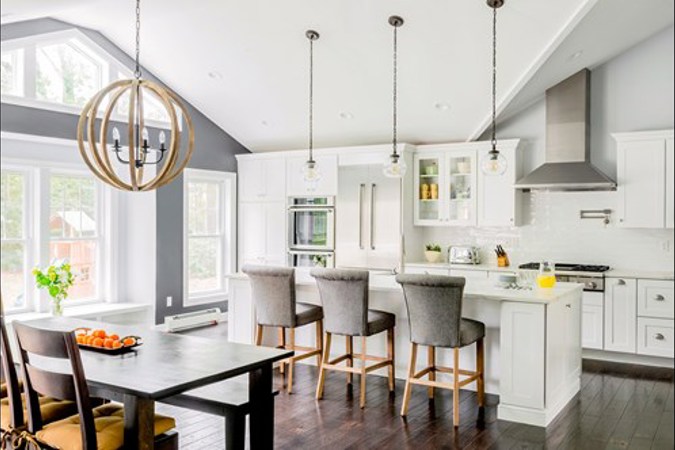Kitchen remodels can both improve the quality your daily life and increase your home’s value. People choose kitchen remodeling for a variety of reasons. According to a 2024 Houzz study, 42% of respondents remodeled because they could "no longer stand the old kitchen." Following closely behind, 36% said they wanted to update their kitchen all along but just became financially ready.
So how do you know if it’s the right investment for you and your home? Is it really worth it?
The return on investment (ROI) for a kitchen renovation varies greatly. According to Remodeling Magazine’s Cost vs Value report, in New England, the ROI for mid to high range renovations averages around 42%.
When thinking about taking on a kitchen renovation, or any remodeling project, a key consideration should be “how much does a kitchen remodel cost?” Only then can you get to that ROI number.
To get the most bang for your buck it’s important to set a budget from the start, know your needs and understand where the money will go. Before shopping for appliances, tile or flooring, know your personal needs and goals for the outcome of the remodel. Then you can create a wish list of desired components and begin your search for a contractor.
Recommended Budget
Don’t look at national averages for the cost of kitchen remodels. That will not be representative of the market in the greater Boston area. The National Kitchen and Bath Association (NKBA) has a recommendation for the value of a kitchen remodel to help homeowners set an appropriate budget. They recommend budgeting 15-20% of the value of your home.
For example:
$300,000 home = $45,000-$60,000 kitchen remodel budget
$600,000 home = $90,000-$120,000 kitchen remodel budget
Once your budget has been determined, cut it by at least 25 percent. Set the extra money aside as a cushion to make unexpected surprises much less stressful.
Cost Breakdown
The NKBA’s guide for an average kitchen remodel is as follows:
- Cabinetry and Hardware: 29%
- Installation: 17%
- Appliances and Ventilation: 14%
- Countertops: 10%
- Flooring: 7%
- Lighting: 5%
- Walls and Ceilings: 5%
- Design Fees: 4%
- Doors and Windows: 4%
- Faucets and Plumbing: 4%
- Other: 1%

Your selection of cabinet type, counter finishes and appliances all contribute to the overall budget.
Determine Priorities
Once you have a general idea of your budget and desires, pinpoint your exact needs and priorities.
- Are you planning to resell your home in a few years or is this your long-term home?
- Are you doing a simple update and refresh, complete remodel or upscale renovation?
- How much kitchen do you need?
- What things do you like best about your current kitchen?
- What things about your current kitchen do you dislike?
- What is the main function of your kitchen?
- Are you a budding chef? Then you may want to invest in a butcher’s block countertop or a professional grade oven and range.
- Do you do a lot of entertaining? Then you may want to design an open space with dimmable lighting and built-in bar.
- Is your kitchen more of a space for kids to do homework while you throw together a quick meal? Then you may want to install a built-in desk, easy-clean surfaces and a durable floor.

The level of construction needed (e.g., tearing down walls) will also contribute to the cost.
Answering these questions and arriving prepared to a consultation with a builder or kitchen designer is a good first step. And be sure to gather some photos of your favorite custom kitchens for ideas.